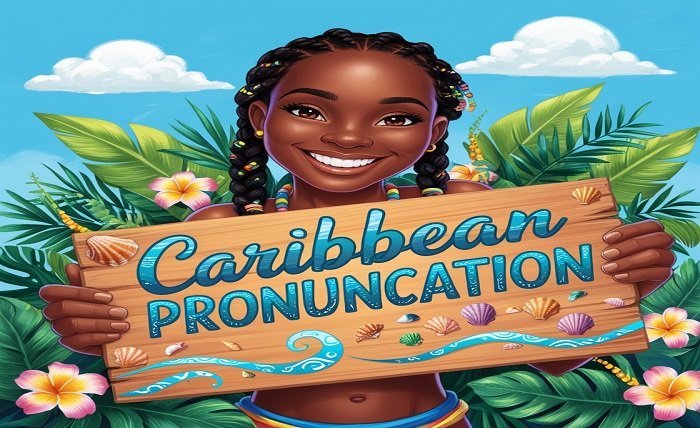The Caribbean is a mosaic of languages and dialects in addition to being a breathtaking paradise of sun-kissed beaches and lively cultures. The linguistic peculiarities and distinctive pronunciation of each island are shaped by social, cultural, and historical influences. This blog post will examine the numerous facets of caribbean pronunciation, revealing the ways in which it influences communication and identity in the region.
Overview
Many languages are spoken in the Caribbean, including English, Spanish, French, Dutch, and several Creole languages. Even within small geographic areas, the pronunciation patterns of various languages can differ greatly from one another. Gaining an understanding of caribbean pronunciation reveals the region’s rich cultural legacy and accentuates its linguistic diversity.
The Caribbean Language Environment
There are many islands in the Caribbean, and each has experienced migration and colonization differently. As a result, a diverse range of languages, including English, Spanish, French, Dutch, and several Creole languages, have been produced. The coexistence of several languages is common in caribbean pronunciation, creating intriguing linguistic dynamics. English is widely used in locations like Jamaica and Barbados, although Spanish is more common in Cuba and the Dominican Republic, demonstrating the colonists’ influence.
History’s Influence on Pronunciation
The Caribbean’s history of migration, slavery, and colonization has had a big influence on how people pronounce their languages. After colonial powers imported their languages, the native inhabitants modified them to create distinctive dialects. African languages have a particularly strong influence on caribbean pronunciation, as phonetic characteristics mimic the sounds of the original African languages spoken by enslaved individuals. Additionally, certain vocabulary and pronunciations still bear the remains of the Arawak and Carib indigenous languages.
Caribbean English: A Change in Melody
From island to island, caribbean pronunciation English differs greatly, with each area creating its own unique dialects. For instance, Jamaican patois is well known for its melodic and rhythmic elements, and it frequently incorporates African language elements to give it a distinct taste. On the other hand, Trinidadian English displays a combination of Indian, Spanish, and English influences due to the nation’s rich cultural legacy.
Creole Languages’ Influence
A fundamental component of caribbean pronunciation, creole languages are distinguished from their parent tongues by distinctive phonetic characteristics. For example, the French-influenced language of Haiti, known as Haitian Creole, uses a unique phonetic system that frequently lengthens vowels and softens consonants. Similar to this, Jamaican Patois has a musical character that appeals to listeners due to its rich blending of Spanish, English, and African languages.
Phonemes in the Languages of the Caribbean
caribbean pronunciation differs from other English dialects due to a number of distinctive phonetic traits. The variance in vowel sounds is one prominent characteristic; in Jamaican English, the vowel sound in “fish” might sound more like “fesh.” Additionally common are consonant alterations; in many Caribbean languages, “th” sounds are substituted with “t” or “d,” turning “this” into “dis.” Furthermore, different stress patterns might have an impact on speech intonation and rhythm.
The Mastery of Harmony
When it comes to caribbean pronunciation, intonation is essential since it adds to the language’s expressiveness and melody. Speech has a musical sound because many Caribbean languages use rising intonation at the conclusion of sentences to convey questions or doubt. In addition to expressing haste or feelings, emphasizing specific phrases can strengthen the speaker’s intended point. Caribbean speech is a dynamic form of expression because of its intonational heterogeneity, which not only represents the lively culture of the islands but also deepens interpersonal interactions.
In Caribbean Communication, Code-Switching
The caribbean pronunciation is known for its flexible language use, as evidenced by the widespread practice of “code-switching,” which involves alternating between languages or dialects throughout a conversation. Depending on the social environment, people switch between speaking English, Creole, and other languages, a tendency that frequently represents cultural identity. For instance, a speaker may use normal English in formal contexts and transition to Creole to convey familiarity or companionship.
Media’s Effect on Pronunciation
The caribbean pronunciation are greatly influenced by media. Local dialects are included in TV series, movies, and music, which retain distinctive pronunciations and foster regional pride. Popular genres like calypso and reggae, for instance, frequently highlight particular linguistic elements, which has an impact on how people speak language, especially younger generations. Furthermore, social media platforms make it possible for linguistic trends to spread quickly, which opens doors for pronunciation to change.
Acquiring Knowledge of Caribbean Pronunciation
The keys to mastering caribbean pronunciation are practice and immersion. Learning about local media, including music, radio, and television, can assist students in developing an awareness of the distinctive rhythms and sounds of Caribbean accents. Practice having conversations with native speakers gives students priceless practical experience and helps them improve their pronunciation in natural settings.
In summary
The rich, diverse linguistic environment of the caribbean pronunciation. Every component that goes into creating a distinctive aural experience, from the impact of media and history to the musicality of speech, is influenced by these factors. Gaining an understanding of these subtleties increases respect for the cultural identities that Caribbean languages represent while also enhancing our enjoyment of the languages themselves.
FAQ
How is pronunciation in the Caribbean done?
The unique ways that different languages and dialects are spoken throughout the Caribbean, impacted by social, cultural, and historical variables, are collectively referred to as caribbean pronunciation. Discover more about: mp4moviez.ming
Why is pronunciation so different across the Caribbean?
The colonial past of the area, the entrance of different languages, and the influence of African and indigenous languages are the main causes of the variation in pronunciation seen in the Caribbean.
What is the best way for me to study Caribbean pronunciation?
Try practicing with native speakers, interacting with local media, or taking language courses that concentrate on Caribbean dialects to find out more.

